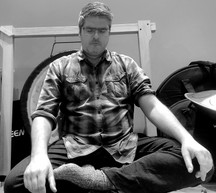What I learnt from meditating every day for 40 days
- Andy Steele
- Nov 1, 2023
- 7 min read
Back in September I challenged myself to a 40 day challenge to have a dedicated time to meditate every day. It feels the right time to summarise what I found helped and hindered me and hopefully it helps someone else, or at the very least gives me something to look back on and stick to.
My original challenge for myself was to take a minimum of 5 minutes every day to notice my thoughts, feelings and emotions and to notice the effect on my mental health. I'm really bad at sticking to a new habit so this time, I thought I'd face my nemesis of social media and post it all online, because then I would have to see it through.
Here are the positives and negatives of what I found through having a regular meditative practice:
1. Mindfulness is for anytime. It doesn't need to have a dedicated time of day. Just being aware of what you're doing as you're doing it; noticing your thoughts and feelings is mindfulness. It helped me live my life as I was living it.
2. Meditation is for a dedicated time and place. I tried using mundane tasks as my opportunity to meditate but I found that I was better off sat in a room, focused on the task of meditating. The mindfulness sure helped with the mundane tasks but it wasn't enough on it's own to be my dedicated time to balance myself out. Using the same place to meditate each day also helped me focus my mind and made the task of meditating easier.
3. Mala beads. Five minutes became easy once I had a routine established after about a week. Just using mala beads takes about 8 minutes (roughly); it's simple, it's portable and I found it hugely effective. These are used with either a mantra (a specific phrase in sanskrit) or affirmation to help focus the mind.

4. Mindfulness and Meditation can be used together. I used Mindfulness to become aware and Meditation to focus. Unsurprisingly, I used instruments like gongs and drums in a lot of practices because sound is one the easiest ways to focus your mind when you're new to it or if like me, you have ADHD and it's hard to focus anyway. Drums helped me find a rhythm; I wouldn't try to dictate what I was playing as such, I would instead listen to what I felt like playing and then I would notice any thoughts, feelings and sensations and then adjust my playing accordingly in a way that either improved my focus or relaxed me.

One of the greatest gifts I've found through playing my drums mindfully is that my ability to improvise has improved dramatically. I'll never become the greatest ever drummer, but that connection between me as a person and drumming has definitely become much more instinctive, natural and spontaneous.
5. Sounds are a great way to focus and/or relax the mind. Clearly not a new lesson for me, but well worth mentioning. Calming the constant churn of thoughts in your mind is hard, especially if you're coming from a place of stress, pain or maybe a medical condition which places additional barriers in your way. Sound not only captures your attention, it is positively charging your brain via electrical impulses from your inner ear. Something else is connected to your inner ear; your vagus nerve. This wends its way through your body connecting your major organs such as your heart, lungs, liver and stomach. This is why we find sound helps us relax.
6. Setting aside a dedicated time and space to practice to meditate quickly became too important to skip. I even measured my blood pressure before and afterwards and I saw my blood pressure lower as a result of the practice. Once I had a little reminder set on my phone to help me establish that new routine, I found it easier to brush other stuff aside and say, "right, it's my moment time; off I go" and whatever I was doing, even if I had a visitor around, off I went to my spare room to meditate.
7. Getting outside to meditate and/or be mindful. Shin-rin yoku or "Forest Bathing" has been something I have regularly spoken about as being something which is really good for your mental health. It's such an effective way to help you mindfully appreciate the life your living. Notice the texture of the surface you're walking on; the roots, the leaves, the paths. Notice the smells, the sounds, the textures of bark and grasses. The sensations from the sunlight, the shade, the effect of movement in your body. Notice how it effects your breath, your emotions, your body, your thoughts. If you can't be outside, try recalling an image of when you were; go into that moment and remember what you saw, heard, thought, felt etc.
8. The most effective methods I tried were the methods I practiced every day. I know that sounds obvious, but I am constantly trying new things and I wanted to show as much as possible because I was recording it publicly. It's good to occasionally try something new, but it's always good to have one or two methods that can be your Go-To-Method especially when it's still a relatively new habit. Meditation is a skill which takes practice. It improves you physically (core muscle stretches and flexibility in hips), mentally (focusing the mind) and emotionally (develops awareness and control). I am looking forward to deepening and lengthening my practice around my favoured method of meditation.
9. One of the things I didn't really post about was how I combined a daily exercise practice with meditation. You can (and should) practice in a variety of positions but some are better suited than others. Two positions which are not great for meditation but are great for lowering blood pressure and building your core muscles are holding Wall Squats and Plank for 2 minutes each. These positions produce quite unpleasant sensations and at first I used music as a distraction from the sensations. However, as my meditative practice progressed, I turned off the music and used a timer instead. This allowed me to instead view the sensations as a product of strengthening my muscles rather than anything negative. It just 'was', which in itself is "Equanimity", another product of meditation which is probably worthy of a separate post at a later date.

10. Meditations can be a shared experience. Some of the most beautiful and surprising moments can come when you share that experience with someone else. Two such moments really stick out for me in particular. One was a sound massage I gave my wife. This is where himalayan singing bowls are placed around and on the back and played in a way which induces an "altered state of conscious (ASC)"; in other words, it induces a near-sleep state where you are neither awake or asleep where you feel both aware and relaxed at the same time. To protect the person I'm helping, I have to hollow my mind and meditate which in turn leaves me feeling calm afterwards too.
The second occasion was very different. I drank a cup of herbal tea with my son after he refused to drink it. I thought it would be an opportunity to co-regulate his energy with my own calmer presence. He drank the tea and appeared relaxed afterwards and we both learnt and practiced something together.
And finally, the hardest thing I found was posting on Social Media. There were times when I was anxious that things sounded like self-therapy. I know for a fact that the picture often became the reason for a reaction rather than the words themselves. Platforms like Facebook, Instagram etc; they promote you if you're paying for something or if you're generating lots of reactions. They are not great for mental health awareness unless you're paying to promote it. Sharing stuff like this so regularly became a little exhausting as it displayed an element of vulnerability each time: Did I share too much? Did I make anyone feel awkward?
A few years ago, I was invited onto BBC Radio Solent to talk about a children's book. Now my creative writing teacher told me to steer the conversation to where I wanted it to go. I was using the experience of my PTSD to write a children's book about yoga. I thought it would be inspiring, and in my head it was. The only trouble is, I don't think that's really what their listeners wanted to hear as they chomped on their cornflakes. I never heard from them again and it taught me a hard lesson that you always need to think of who, what and how you're sharing what you want to say.
As a result of this (and many other experiences), there was one post in particular (below) during the 40 days, which was the hardest thing I had shared. It was a picture of me walking through Portsmouth late one night as a fight broke out to the right of the camera. Because I regularly use mindfulness and meditation; I didn't feel any panic; I didn't experience any flashbacks; I was fine. I was comfortable being myself in that moment. I didn't love being in that moment; but I recognised that I was in control of my emotions, behaviour and mind in that situation. Noticing this was hugely empowering and gave me confidence, that despite the highs and lows in life, I might finally have closure.

The lesson from this is don't feel compelled to publicly share everything. It's ok to keep some stuff back for you. Just because you experience a challenge; it doesn't mean you should feel compelled to tell the world about it. It's ok to be still, listen and not react. You don't need to have an opinion about whether something is good or bad. There are no bad emotions. Even Anger is just an emotional response to a threat, and in a genuine threat, anger could save your life in an act of self-defence. It's about cultivating the right emotional, mental and physical responses to a given situation or experience, and that is probably the greatest gift that the last 40 days has taught me.






















































Comments